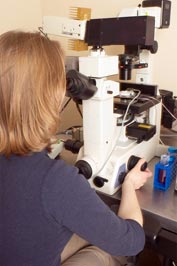Women in Medicine Part 7
Can women "have it all?" That is, can they be good mothers, wives, daughters, friends, neighbors, and still be good doctors?
Are women as competent as men?
Are women achieving their potential?
What can women do to achieve more?
by Kevin Pezzi, MD

I believe that women could be every bit as capable as men in terms of inventing, winning Nobel Prizes, and attaining other achievements predicated upon exceptional brainpower—which women seem less destined to have, considering the wider Bell curve for male intelligence—IF they exploited their strength in verbal intelligence and used other stratagems to augment their skills in areas such as visuospatial ability, where they are generally outperformed by men. I believe that the brain is much more malleable than what is commonly believed. I asseverate that brainpower can be significantly amplified if the mind is properly stimulated. Traditional educational pathways, even for arduous career paths such as medicine, are wonderful for expanding knowledge, not intelligence. The fact that virtually all educators fail to capitalize upon this latent ability is what leads most people to assume that intelligence is fairly static. It need not be. My sixth grade teacher thought that I was an idiot, and the Dean of my medical school thought that I was a genius. What happened along the way? I had some good teachers, but probably no more than other folks whose IQs did not improve whatsoever. So what accounted for the upswing in my intelligence? I learned the secret to expanding brainpower. Anyone could do what I did, but most people are stuck in educational ruts that are defined by teachers who haven't the foggiest idea of how to augment intelligence, not just knowledge.

Now let's discuss a new topic. It may superficially seem unrelated to Melanny's message, but it is a question that everyone with aspirations of a medical career should ask himself or herself: why do you want to be a doctor? If money or status are part of your justification, you should have been a doctor a few generations ago. Not now. Anyone who is smart enough to become a doctor is also smart enough to make even more money in other occupations. In terms of respect, you will find very few people admiring doctors—and most of those people are themselves doctors. Instead of demonstrating esteem for what doctors do, I hear much more complaining and Monday-morning quarterbacking in addition to lawsuits motivated by revenge. To put it in shirtsleeve English, being a doctor just ain't what it used to be. The practice of medicine is a job that could only be loved by someone who is either a masochist, possesses very thick skin, or thinks that caring for patients is a reward in itself. Physicians now must battle more than disease, long hours, and the incessant demands of a career that will monopolize the majority of your life—assuming that you are not one of those docs who think that their patients come after golf, marriage, children, and soccer practice. Doctors must also battle insurance companies, politicians, lawyers, bureaucrats, hospital administrators, and scads of patients who are oblivious to the limitations of modern medicine. It is a tough life. Don't let anyone kid you that it is not.
Are there rewards? Yes, and some are priceless, but here's the rub: the rewards, the gratitude, and the moments of triumph are less frequent than you might imagine. A friend of mine is a psychologist who works with doctors. She thinks that so many physicians are dejected because the rewards they once imagined never materialized to the degree they projected. For every patient I had who thanked me for saving his life, I had a hundred who screamed and swore at me because they thought they should have been seen more promptly. It's revealing to note that patients who required expeditious treatment were not the complainers; it was the ones with minor complaints and invalid reasons for visiting the ER, such as seeking narcotics for fun or profit, or for any of the myriad goofy reasons that I described in True Emergency Room Stories (now available as a free download).

Compliment people whenever you
can, but avoid lauding the appearance
of very attractive women (here's why).
Be specific with your praise; don't choose
overused accolades such as, "You're
amazing." (Translation: "What I find
amazing about you is your appearance."
People have a need for recognition, compliments, and positive feedback that is often unmet. Judging by how infrequently they are delivered, one might expect that delivering praise is an arduous task. I think that I am more likely than others to give justified praise to people. When I do this, I often obtain reactions which indicate to me that they are not accustomed to receiving praise. I don't know much about the gratitude bestowed upon doctors in the powder-puff specialties such as dermatology and allergy/immunology, but in the high-octane world of the ER, you will likely get far fewer positive strokes than you think.
Imagine if you were a sports star and the fans stopped cheering when you made a great play. Wouldn't that bother you, at least a bit? Doctors never have a stadium full of adoring fans and ebullient cheerleaders; we are supposed to be self-motivating and rewarding. Most of the great things that doctors do go unnoticed. Occasionally a nurse or patient will appreciate your acumen, but most of your "great plays" are disregarded. In contrast, your errors are often subjected to endless scrutiny. You may be a great doctor 99.99% of the time, but errors committed in the .01% of the time you aren't perfect can leave you with several permanent black marks on your record. As if this is not bad enough, some of these black marks can come in the form of frivolous lawsuits are unconscionably absurd. You can perform flawlessly and still be sued (two real-life examples are presented here and here). Yes, really.
The bottom line is this: prospective doctors usually assume that medicine is a rewarding career. The rewards are evaporating while the stresses are mounting. Many physicians find that this balance leaves them regretting their career choice. According to what I've read, in the past few years the percentage of medical school seniors who regret going into medicine has skyrocketed, and this is even before they face the harsh realities of being an attending physician. When I contemplate what it took to become a doctor, and then think of the rewards I've obtained from practicing medicine, I usually conclude, "I worked that hard . . . for this?" If you devoted a month to something that was ultimately a letdown, you would not be nearly as disappointed as you would be if you had spent a decade chasing your dream.

Real estate agents can earn more
than doctors, but so can truck drivers,
strippers, and even life coaches.
Skeptical? Read my discussion of
how little society values what doctors
do vis-à-vis what others do in
occupations that require much less
brainpower, dedication, education,
sacrifice, and personal risk.
I don't want to leave you with the impression that being a doctor won't leave you with some great memories (here are some of mine), but it would be remiss of me not to warn you of what you will likely face. Some doctors—the ones with endogenous Prozac—seem very content with their medical careers. Most docs are less sanguine. How can you be chipper when your yearly malpractice insurance premium is greater than your home mortgage? That's happening to an increasing number of doctors. Coupled with the other problems they face, it is no wonder that being a real estate agent looks so attractive. As I've mentioned elsewhere, I know doctors who are now bartenders, Amway reps, plumbers, financial advisers, and police officers—anything but doctors! Believe me, it takes supreme discontentment to flush a decade-plus of training down the drain, leaving your mother struggling to explain to others why you no longer work as a doctor.
Before you go into medicine or any other field, you need to ponder what it is that you truly enjoy doing. Do not be misled by the glamorized and sanitized stereotypes of those professions; learn as much as you can about the minute-by-minute realities of what those jobs entail. Then realize that what may seem rewarding now will likely lose some of its luster in time. In my first five years of being an ER doctor, I truly enjoyed saving lives and making diagnoses that other doctors missed. In the next five years, even though I was indisputably a better doctor, the rewards were less gratifying and more fleeting. I just saved a life? Who cares? There is no time to bask in that glory. Just pick up another chart and rush to see another patient, and another, and another. Wait! What does being an ER doctor entail? Primarily a lot of rushing. The ER docs who don't rush are either working in slow emergency rooms or cutting too many corners. Are they reviewing the old charts, EKGs, and x-rays of their patients? Are they truly educating their patients and family members, taking the time to thoroughly answer their questions? Are they checking everything they should be checking in the history and physical? (Judging from my time spent serving on Quality Assurance committees, I know that most doctors are not nearly as thorough as they think they are.) I don't like time pressure, nor do most people. Having an adrenalin-rush job may seem appealing when you are young, but after a few years it just becomes wearisome. Rushing isn't good for doctors or patients, but it is an almost unavoidable aspect of modern medical practice.
You might think that the frenzied pace of the ER would be easier to handle as you gained experience and efficiency. That would be true if the ER patient volume did not increase, but it usually does at most hospitals. For every year that I was an ER doctor, the emergency rooms in which I worked treated about 15% more patients than they did the year before. Therefore, the patient volume would double every five years. However, the ER physician staffing stayed the same: one doctor working the day shift, two working the afternoon shift, and one (often me) working the night shift. When I first began working, the pace was often slow enough that I could leave work with a smile on my face. After several years of work, my predominant emotion while exiting the ER was not happiness but relief that I was finally leaving that pressure cooker—at least for the next 9 to 12 hours.
So are you willing to devote the next decade of your life to becoming an ER doctor, thereby subjecting yourself to the punishment inherent in that occupation? One of the reasons why I was so willing to give up what could have been the best years of my life and devote them to becoming a doctor is because I thought that sacrifice would earn me the right to have a good life afterward. Frankly, I was gypped. My tacit pact with society—that I would forfeit those irreplaceable years and spend them doing things that no one should have to do, such as working 110 hours per week—was a lopsided quid pro quo in which I gave everything asked of me, and then some, but never obtained the pot of gold. (I am speaking metaphorically, and not necessarily referring to the fact that physician incomes can be less than that of real estate agents who must, in my state, "sacrifice" a whopping one week of time in class to obtain their license.) I don't think that there is anything Machiavellian about this. I don't think that society is intentionally deceiving prospective doctors just to keep them from choosing other professions. Intentional or not, society is paying a price for this deception. Society—and that means all of us—pays a price for having grumpy, discontented doctors whose cravings for rewards can only be met outside of medicine. This diversion of focus is the antithesis of what society wants, and needs. It needs doctors who eat, sleep, and breathe medicine, not doctors who chauffeur their kids around town from one activity to another in minivans and are too preoccupied with their personal lives to make patients their primary focus.
I've seen substantiation of this time and again. The most recent event was when I called my Mom's doctor at noon on Friday to check on the result of a recent test. My Mom's physician, who I will call Dr. Pococurante, said this test was necessary for determining her subsequent treatment, which was scheduled to begin the following Monday. Since my Mom had a potentially fatal disease (bladder cancer), one might think that this was important. Old Doc Poco initially refused to check on the test's result. Then she said that she wasn't sure if the test had been done. Startled, and now more determined than ever to have her check on this, I reiterated her words about how the test result was key to charting my Mom's therapeutic course.
Dr. Poco curtly asked, "Can't you tell where I am?" She explained that she was in her car, heading out of town on personal business.
"Yes, but it's noon on Friday," I objected, wondering what sort of personal business could be more important than a patient's life. Umm, isn't it crazy to have this discussion at all? Shouldn't doctors always put their patients first? Evidently not now.
Dr. Pococurante then said that my Mom was no longer her responsibility. She said that she'd passed her along to the oncologist. I realize that modern medical care is fragmented by specialists, but I'd never before seen a primary care physician deny responsibility for a patient just because a specialist would soon see her. Especially in view of the uncertainty about whether the test had even been done, I felt that it was premature for the primary care doctor (who is really the quarterback of the team) to excuse herself from the game. Doc Poco did not agree, and she spent a couple hours arguing with me about whether it was her responsibility to check on the test. She ultimately agreed, but not after I wondered what sort of pit bull personality aberration could produce a willingness to fight for two hours when it would have taken only a minute or two to check on her test result. In the course of this argument, which wandered a bit off course as arguments often do, I brought up another matter. My Mom's cancer had possibly spread to her vagina. I asked Poco if she'd checked that site. No, she rudely said, then added, "Why don't you check it?"

"That doctor said WHAT???"
I couldn't believe my ears, and responded that it would be inappropriate for me to examine that area. Now I thought that Poco was twisted in addition to being lazy. And perhaps incompetent, too. The last three doctors who treated my Mom thought that her back pain was typical musculoskeletal pain. It obviously was not, and I insisted that she have a MRI scan. That scan showed exactly what I feared: metastatic cancer to the spine and pelvis.
Incompetence is occasionally excusable because we're all human and thus prone to error for a multitude of reasons. But flagrant laziness is not excusable, especially when it is so viciously defended. But that is the type of dedication we're seeing in physicians these days. Society has said "screw you" to the doctors, and the doctors are mirroring this sentiment. The doctors of yore got more, and gave more. They would have never thrown a temper tantrum if a patient's son requested that they check on an important test result. Nor would they have likely been skedaddling out of town at noon on a weekday. But as the old saying goes, you get what you pay for. Society has withdrawn some of the rewards of being a doctor, and the doctors have responded with less dedication and more aloofness.
I don't think that I have all the answers as to how this rift between doctors and society should be repaired, but the answer is not for the medical profession to fill its ranks with docs who want to have it all. Why? Because this may compromise patient care. Medicine is more than a mere occupation; it is really a calling for supremely dedicated individuals to devote their lives to helping others. Discharging this obligation to serve others and put them first requires considerable dedication—frankly, more dedication than many doctors are now willing to give.
You might think that a shift-work specialty like ER would be a great way for a woman whose dedication is necessarily subtotal could be a doctor without shortchanging her patients. This is true to some extent, but what if you try to juggle the responsibilities of being a wife and mother at the same time you are in medical school and residency? Do you think that you will learn as much as you otherwise might have? I don't understand how this is possible. We all have a 24-hour-per-day pie to slice up as we see fit. The question is: how do you want to slice your pie?
